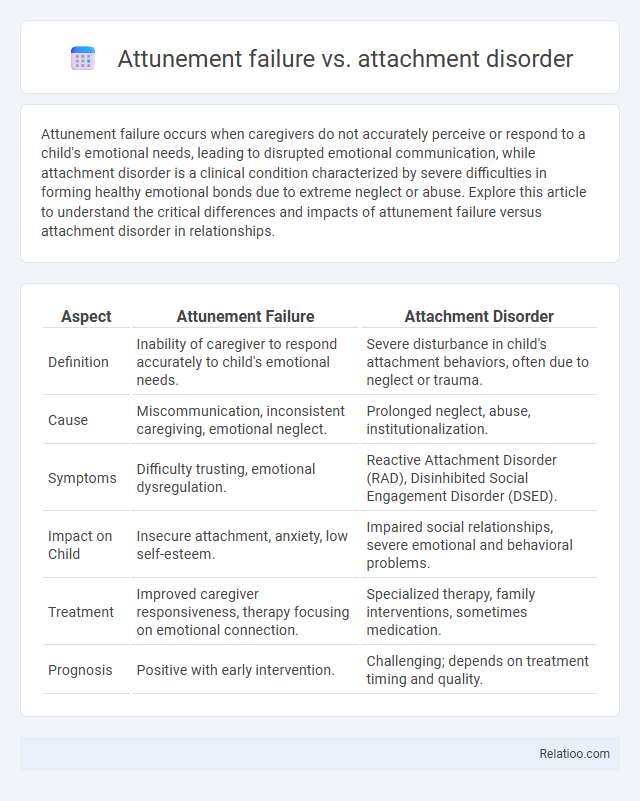Attunement failure occurs when caregivers do not accurately perceive or respond to a child's emotional needs, leading to disrupted emotional communication, while attachment disorder is a clinical condition characterized by severe difficulties in forming healthy emotional bonds due to extreme neglect or abuse. Explore this article to understand the critical differences and impacts of attunement failure versus attachment disorder in relationships.
Table of Comparison
| Aspect | Attunement Failure | Attachment Disorder |
|---|---|---|
| Definition | Inability of caregiver to respond accurately to child's emotional needs. | Severe disturbance in child's attachment behaviors, often due to neglect or trauma. |
| Cause | Miscommunication, inconsistent caregiving, emotional neglect. | Prolonged neglect, abuse, institutionalization. |
| Symptoms | Difficulty trusting, emotional dysregulation. | Reactive Attachment Disorder (RAD), Disinhibited Social Engagement Disorder (DSED). |
| Impact on Child | Insecure attachment, anxiety, low self-esteem. | Impaired social relationships, severe emotional and behavioral problems. |
| Treatment | Improved caregiver responsiveness, therapy focusing on emotional connection. | Specialized therapy, family interventions, sometimes medication. |
| Prognosis | Positive with early intervention. | Challenging; depends on treatment timing and quality. |
Understanding Attunement: Definition and Key Concepts
Attunement refers to the caregiver's ability to accurately perceive and respond to a child's emotional and physical needs, fostering secure attachment and healthy development. Attunement failure occurs when a caregiver consistently misreads or neglects these signals, potentially leading to attachment disorders characterized by difficulties in forming healthy relationships. Understanding attunement involves recognizing its role in emotional regulation, communication, and the establishment of trust between caregiver and child, which are critical for preventing attachment-related issues.
What is Attachment Disorder? Signs and Symptoms
Attachment disorder is a serious emotional and behavioral condition in children resulting from inconsistent or neglectful caregiving, impairing their ability to form healthy emotional bonds. Common signs and symptoms include difficulty trusting others, extreme clinginess or avoidance, trouble regulating emotions, and challenges in forming secure relationships. Unlike attunement failure, which is a specific breakdown in parent-child emotional synchronization, attachment disorder reflects a broader pattern of attachment-related issues affecting social and developmental functioning.
Attunement Failure vs Attachment Disorder: Core Differences
Attunement failure occurs when a caregiver consistently misreads or fails to respond appropriately to a child's emotional signals, disrupting emotional communication and bonding. Attachment disorder is a clinical diagnosis characterized by severe difficulties in forming healthy emotional attachments, often resulting from neglect, abuse, or attunement failure in early childhood. The core difference lies in attunement failure being a relational process affecting emotional regulation, while attachment disorder manifests as a diagnosable condition impacting social and emotional functioning.
Causes of Attunement Failure in Early Relationships
Attunement failure in early relationships often arises from caregivers' inconsistent responsiveness or emotional unavailability, disrupting your infant's ability to develop secure emotional connections. Unlike attachment disorders, which are clinically recognized conditions involving severe disturbances in emotional bonding, attunement failure primarily affects the subtle, moment-to-moment emotional tuning between caregiver and child. Causes of attunement failure include parental stress, mental health issues, or trauma, all of which impair the caregiver's capacity to accurately read and respond to the child's emotional needs.
Developmental Impact: How Attunement Shapes Attachment
Attunement failure disrupts the caregiver-infant emotional connection essential for secure attachment, leading to attachment disorders characterized by difficulties in trust and emotional regulation. Secure attunement fosters neurodevelopmental growth, promoting resilience, empathy, and social competence during critical developmental windows. Attachment disorders resulting from attunement failure manifest as insecure or disorganized attachment styles, impacting long-term mental health and relational stability.
Recognizing the Signs of Attunement Failure in Children
Recognizing the signs of attunement failure in children involves observing difficulties in emotional reciprocity, lack of eye contact, and delayed social responsiveness that hinder healthy attachment development. Unlike attachment disorders characterized by extreme behavioral disturbances or social withdrawal, attunement failure reflects subtle mismatches in caregiver-child emotional communication impacting your child's emotional regulation. Early identification promotes targeted interventions to restore emotional connection and support your child's social and emotional growth.
Long-term Effects of Attachment Disorders on Mental Health
Attachment disorders result from early disruptions in caregiver-child bonding, leading to profound long-term effects on mental health such as anxiety, depression, and difficulties in emotional regulation. Attunement failure, a specific type of attachment disruption where caregivers are unable to accurately read and respond to a child's emotional needs, can exacerbate these mental health challenges by impairing the development of secure relationships. Understanding the distinctions between attachment disorder and attunement failure is crucial for addressing Your emotional well-being and implementing effective therapeutic interventions that promote healthier attachment patterns.
Therapeutic Approaches for Attunement and Attachment Repair
Therapeutic approaches for attunement failure focus on enhancing caregiver responsiveness through techniques like reflective functioning and co-regulation, aiming to rebuild secure emotional connections. Attachment disorder treatments prioritize establishing safety and trust, often employing trauma-informed therapy, play therapy, and parent-child interaction therapy to address deep-seated relational disruptions. Your healing journey benefits from therapies targeting both attunement and attachment, as integrated interventions promote emotional regulation, empathy development, and secure relational bonds essential for long-term psychological well-being.
The Role of Caregivers in Preventing Attachment Issues
Caregivers play a critical role in preventing attachment issues by providing consistent emotional attunement, which fosters secure attachment and healthy emotional development. Attunement failure occurs when caregivers are unresponsive or misaligned with a child's emotional needs, potentially leading to attachment disorders characterized by difficulties in forming stable relationships. Early, sensitive caregiving that recognizes and responds appropriately to a child's cues helps mitigate risks associated with attachment disorders and supports optimal psychological resilience.
Building Secure Bonds: Strategies for Promoting Healthy Attunement
Attunement failure occurs when caregivers consistently miss or misread a child's emotional cues, potentially leading to attachment disorders characterized by difficulty forming secure bonds. Building secure bonds involves strategies such as responsive caregiving, active listening, and emotional validation to promote healthy attunement. Your role in providing consistent, empathetic interactions helps repair and strengthen these connections, fostering emotional resilience and trust.

Infographic: Attunement failure vs Attachment disorder
 relatioo.com
relatioo.com